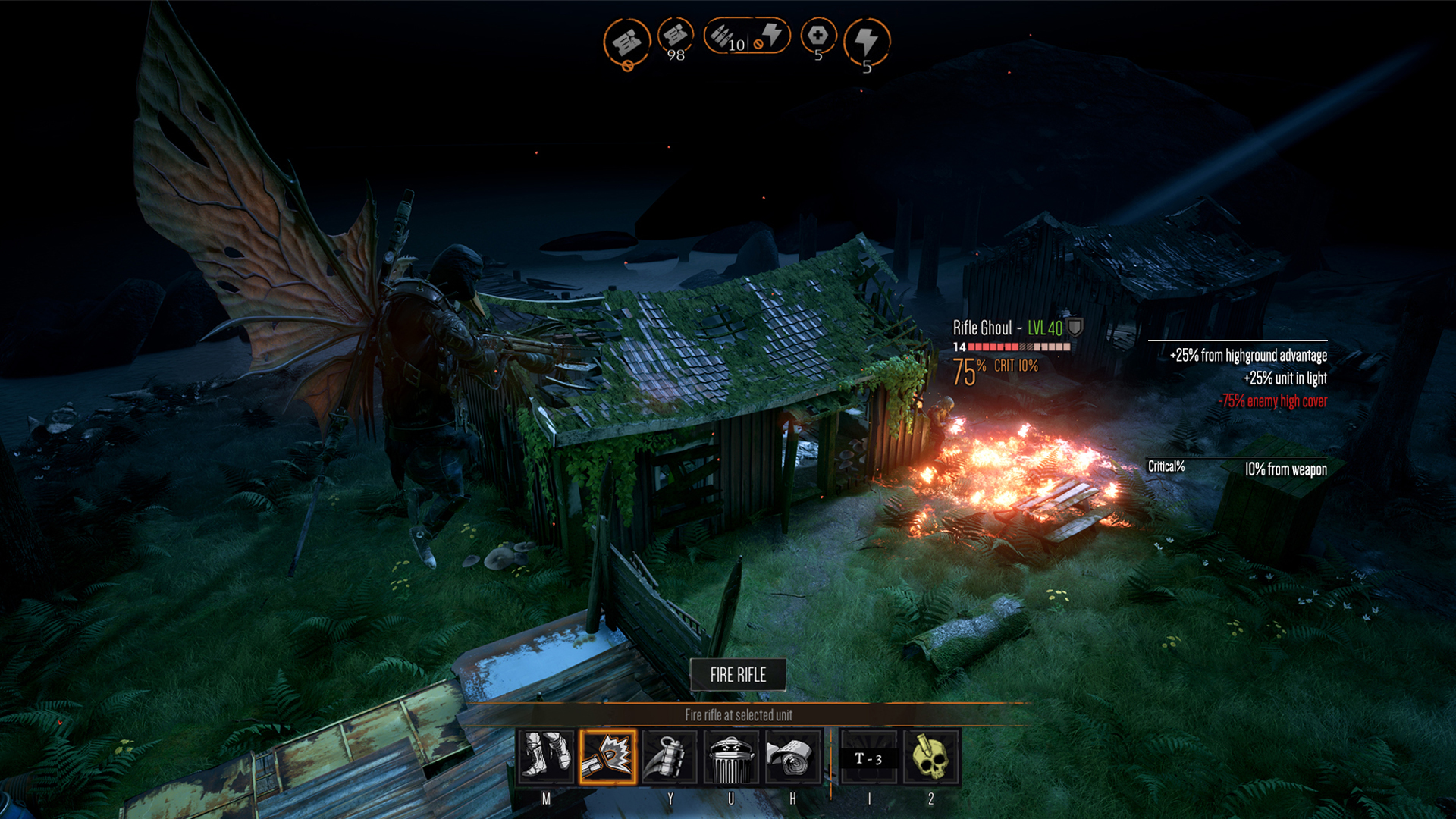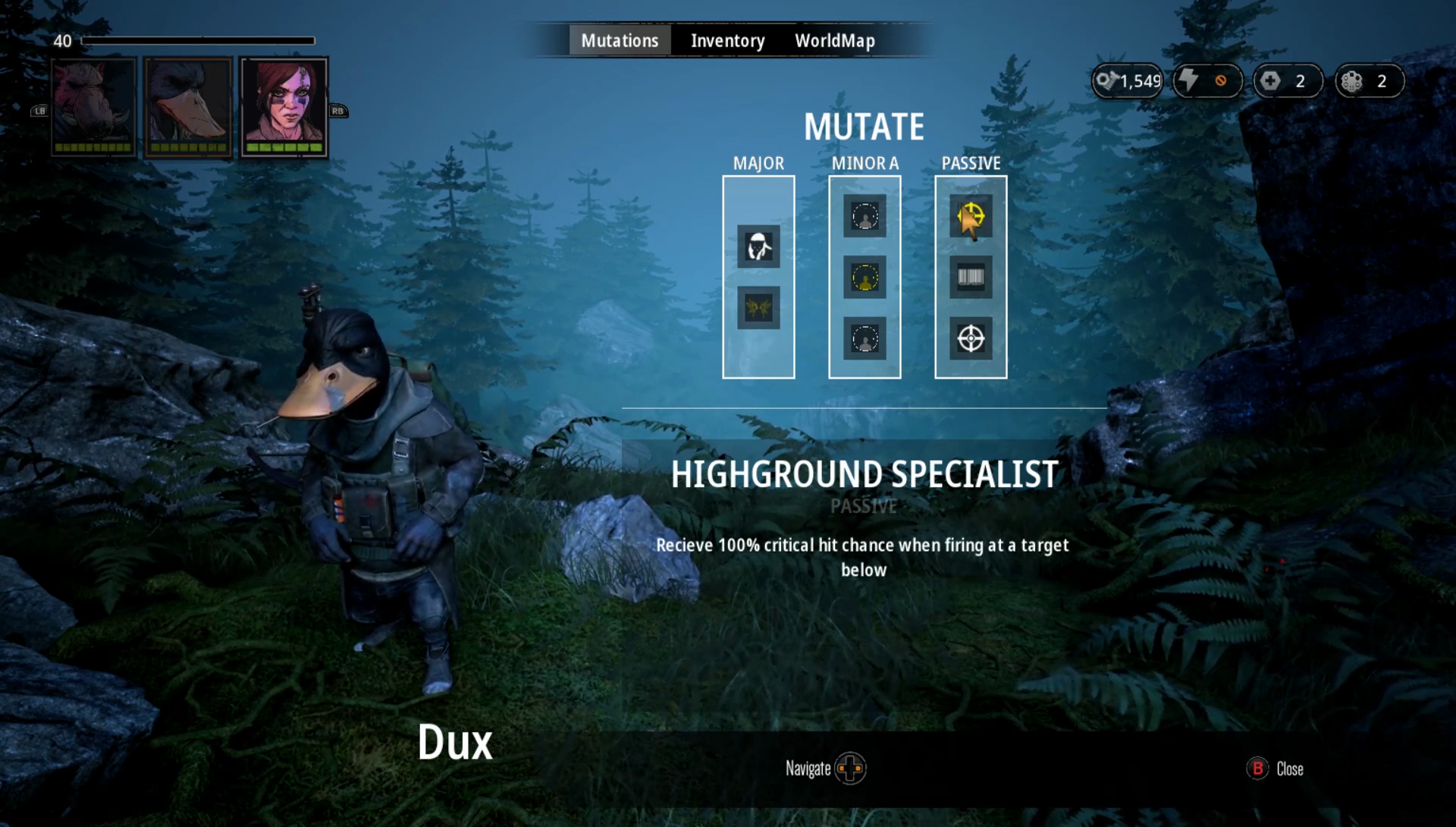XCOM meets stealthy RPG in the seriously cool Mutant Year Zero: Road to Eden
Former Hitman designers have gotten back together to build an exciting RPG around an XCOM core.
If you thought XCOM + Mario was a weird pitch for a videogame, Mutant Year Zero: Road to Eden is here to blow your mind with an even more bizarre pitch: XCOM + Howard the Duck. Plus sealth. Plus, uh, about 30 years of RPG heritage pulled from a Swedish pen-and-paper game called Mutant that first debuted in 1984. This videogame is weird as hell. After watching an hour demo and drilling the developers for more details, I also think it's going to be really fucking cool.
Genetically mutated animals and humans are scavenging and fighting to survive in the post-apocalypse. Exploration of Mutant's near-future post-apocalyptic setting adds the biggest twist to XCOM's formula, with characters to level up, loot to find, and a story to unravel. It also gives you the opportunity to stealthily roam around an area before triggering combat. Like a typical RPG, everything plays out in real time as you're roaming around the world. Once you start a fight, though—or get spotted while you're trying to get into position—it's pure, tactical XCOM.
When you understand the pedigree behind Mutant Year Zero, its addition of more robust stealth than what you see in XCOM2 starts to make a lot of sense. The team I met with included former lead designers from IO Interactive, who worked on the last two Hitman games.
The whole entire Swedish developer scene of my age wants to do this game.
Ulf Andersson
"This is actually a game I wanted to do 10 years ago, but couldn't fund it, couldn't find the opening to do it," said David Skarin, who was the lead gameplay designer on 2016's Hitman. He roped in former Hitman level design lead Lee Varley and Ulf Andersson, who co-founded Overkill software and designed the Payday games.
"I grew up on these things," said Andersson, motioning to the Mutant RPG book they brought along to show off. "This is one of the things I always wanted to make. The whole entire Swedish developer scene of my age wants to do this game."
Mutant revolves around a safe haven called the Ark, a sort of shantytown safe haven for mutant humans and animals built on top of a bridge. In the game the graphics aren't completely finished and it's a bit empty, but the soft glow of neon lights and fire barrels dot the trellises and light up the makeshift shacks. Here there's a bar for taking on missions, a crafting station, and the chambers of the Elder, a frail old (and mysteriously unmutated) man who looks after the survivors of the Ark like his children.
Everything outside the Ark is the Zone, where you'll explore, scavenge for resources, and meet new characters to recruit into your party. Varley compared the way you'll expand your party to Japanese RPGs—those new characters will have a story that comes along with them. All of this comes straight out of the pen-and-paper RPG.
The biggest gaming news, reviews and hardware deals
Keep up to date with the most important stories and the best deals, as picked by the PC Gamer team.
"It's not a resource management game in the same way as XCOM, but you do bring artifacts and things back from the Zone, which improve the lives of these people," said Skarin. The mission he took on had him hunting down a generator, which would let them turn on more lights at the Ark instead of burning trash. I asked if most of the characters would be animals or humans, and Skarin said that in the world of Mutant, humans are more common, but the playable cast will largely be mutant animals because they're more fun.
I got a good, long look at how a typical combat situation will play out. In a small encounter, Skarin came across an isolated Howler Ghoul, who has a phonograph horn strapped to her shoulder and can call in reinforcements if she gets the chance. Here's where stealth comes in: As you're exploring in real time, enemies have a white "tension" radius around them that serves as a generalized vision range. Step into it and you'll get spotted, initiating combat right where you are and giving them the advantage. Make too much noise or get caught in something like a spotlight, same thing. But if you can sneak your way around, you can get into cover, flank an enemy and initiate combat yourself, getting the first move.
"What we want you to do, embracing the pen-and-paper RPG, is scout it up, come up with a great plan, and then fail on your second die roll and improvise from there," Skarin said with a laugh. In the demo build, the character I like to think of as Howard the Duck—real name Dux—was equipped with a crossbow, which Skarin used to kill the Howler Ghoul quietly, before she could blow her horn and call for backup. The die rolls came out in his favor that time.
In combat everything feels very XCOM, down to the two-chunk movement system, overwatch as a skill, and equippable secondary weapons like grenades. But mutations, the game's perk system, offer a fun alternative to a rigid skill tree. As each character levels up, you'll spend points to unlock three or four mutations in three categories: major, minor, and passive. Before any given battle, you can equip one mutation in each category, tailoring your loadout to the fight ahead.

"We want it to be very match specific, who you bring into the fight, of the characters we have, and how you configure them," said Skarin. Dux can choose a mutation that makes him sprout gross (but useful) moth wings, for example, which give him a high ground advantage ideal for long distance sniping. "There's no real point to having the wings in the underground bunker, for instance," Skarin said.
It's packed with character and loot that has character, like a tophat that confers a high ground bonus.
Right now, there's a pool of about 30 different mutations split up amongst the recruitable characters. There will be some overlap, but the characters will all have unique mutations, too. The biggest distinction from XCOM in combat is having a party limited to only three units (the same number as in Ubisoft's Mario + Rabbids: Kingdom Battle, actually), which the developers said felt like just the right number. They started with five and worked their way down until there was never a time when one or two party members sat around idle.
In a big encounter that made up the back half of our demo, Skarin took on a group of ghouls who were trying to get a large combat robot back up and running—with a little help from the robot, which you can reprogram if you find a clue while exploring. I hope there are frequent narrative touches like this in combat that don't feel too samey or too obvious, but it at least seems like the sort of thing the designers of Hitman would excel at.
I also got a good look at how varied these sorts of combat encounters can play out, and how important positioning can be when you're outnumbered. Skarin sent Bormin, the pig man, out into the open to draw fire. With his stoneskin mutation, he can soak up the damage. Dux took on the high ground, but nearly died when a rampaging heavy ghoul (think an XCOM Muton) came after him. Bormin also started taking damage over time thanks to a flamethrower-wielding pyro. A well-placed smoke grenade on the leader of the ghouls kept her out of action long enough for Skarin to mop up the rest.

Mutant Year Zero isn't the only game coming out this year that makes Julian Gollop's assertion that XCOM is now a genre feel prescient, but it's exciting to see it marry what looks like a damn fine tactical game with a full RPG. It's packed with character and loot that has character, like a tophat that confers a high ground bonus. I want to see more of the recruitable characters and how much story they'll really bring with them. I dig the idea of the Zone being a world you can explore fairly freely; in my demo, the party was level 40, about the same level as the enemies they came up against. But it's possible to skip encounters that are too tough and come back to them later, or stealthily position yourself to take out an isolated enemy instead of fighting a whole group at once.
"This level is kind of a big fight, you end up here after a smaller little story on the map, where you find this guy on the map who tells you about the stolen generator. But then you have other maps with lots of small fights which are more exploration based, and you walk around and run into something in the woods, or in the city," Skarin said. "So we can change the pacing of a turn-based game by doing different sized fights and things, which is really nice."
I hope a properly outfitted team will let you take on enemies that outrank you, though Andersson said you'd likely get destroyed if you went up against level 40 enemies with a level 30 crew. I'm betting experienced XCOM players will find creative ways to prove that false. And those players will have some challenging options: by default there's no permadeath in battle, since these characters have story attached to them, but permadeath will be an option. There are also difficulty settings that will affect how much you heal between battles and what kind of penalties you'll suffer after being downed.
Mutant Year Zero might be the first strategy game I've seen built in Unreal Engine 4, and even the dark forest map I saw demoed looked gorgeous. The environment is packed with swaying ferns, shadows and soft lights blanket every area, and there's a ton of detail to be seen when you zoom in on a character to take a shot. I expect it to be a game much like Divinity: Original Sin 2, where it's more effective to take in the whole battlefield at once, but I'll keep zooming in to admire the art.
Mutant Year Zero: Road to Eden is out this year, which hopefully means we'll get to see more of its story and exploration in the near future.

Wes has been covering games and hardware for more than 10 years, first at tech sites like The Wirecutter and Tested before joining the PC Gamer team in 2014. Wes plays a little bit of everything, but he'll always jump at the chance to cover emulation and Japanese games.
When he's not obsessively optimizing and re-optimizing a tangle of conveyor belts in Satisfactory (it's really becoming a problem), he's probably playing a 20-year-old Final Fantasy or some opaque ASCII roguelike. With a focus on writing and editing features, he seeks out personal stories and in-depth histories from the corners of PC gaming and its niche communities. 50% pizza by volume (deep dish, to be specific).

